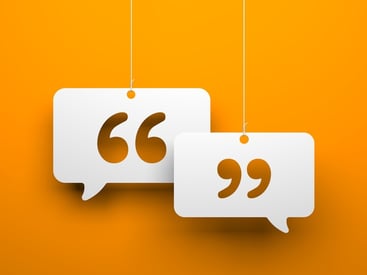 Editor’s note: This week’s post is taken from a conversation between Mark Duval, Founder of The Duval Partnership, and Dave Fischer, who is the owner of a Sandler Training franchise based in New York City. It has been edited for clarity. Read the first post in this series here.
Editor’s note: This week’s post is taken from a conversation between Mark Duval, Founder of The Duval Partnership, and Dave Fischer, who is the owner of a Sandler Training franchise based in New York City. It has been edited for clarity. Read the first post in this series here.
Does your agency have a hard time getting from conversation to closing? Read this for tips on how you can create better outcomes.
The pitfalls of verb-led questions
Dave: Earlier I mentioned verb-led questions, and I think many times, that comes up when agencies decide, “Let's just use referrals.” And I’ll give an example of where I see this happening. Somebody at the agency will call a client up, and they'll say, "Do you know of anybody that can use our help?" And that's a verb-led question. Verb-led questions start with words like do, does, is, could, can, or should.
The danger is that these questions always lead to a one-word response, which is yes or no. So you could think about rephrasing it to say, "Who within your network do you think would be open to a conversation about … ?" And then you can insert a pain point that you solved. So that's one example where you're using a slightly better technique, with minimal effort, to get a better outcome.
But let's say you're doing prospecting outreach and maybe you get that referral and you get on the phone with the person and they tell you, "Well, we already are working with somebody like you, one of your competitors." Now, most salespeople will say at that point, "Thank you very much. Call me if anything changes." And then you have another percentage of salespeople who will say, "Are you happy or is there anything they can do any better?"
Those are both examples of using verb-led questions. "Are you happy?” usually triggers a response like "Yes, we're happy." While "Is there anything they could be doing better?" often triggers a "No." But if you were to craft more of an open-ended question, you may hear the name of the competitor they're working with, and yes, perhaps it's a great company, or it's a great agency, but what is one thing that they could be doing better? We'll get a little bit more engagement from that approach than if you just say, "Are you happy?" or, "Is there anything they could be doing better?"
Pitching your demo vs. understanding problems
 Mark: What would be a quick guesstimate of those salespeople who are so happy to get a prospect on the line that they immediately start selling their wares or their services rather than trying to determine if there's an opportunity? Do you feel that most salespeople just start their pitch as soon as they get someone on the line?
Mark: What would be a quick guesstimate of those salespeople who are so happy to get a prospect on the line that they immediately start selling their wares or their services rather than trying to determine if there's an opportunity? Do you feel that most salespeople just start their pitch as soon as they get someone on the line?
Dave: Unfortunately, I do believe that a larger majority of salespeople take that approach. I also think part of it is that they anchor their outreach in terms of doing a demo. So I get a lot of outreach that says, "Let's setup a quick call so I can demo my product." The outreach messages don't say, “These are issues that we typically help people like yourself with. If these are things you are also struggling with or are challenged by, would you be open to a 15-minute conversation to talk a little bit more about it?”
If your outreach is starting off with, "Hey, would you like to get on a call so I can demo my product?" you're automatically setting it up that you are going to be doing a presentation (as opposed to a diagnostic of their issue). Now, part of the reason that happens is that companies invest a lot of money into training people on their product or service. I've seen really elaborate decks, and people have to go through a certification to be able to present it. But they don't spend enough time working on the other side of it, which is trying to connect that technology to some of the specific issues that people may be having. Which would then make people want to hear more about the supposed solution.
Mark: So all of that time spent on those elaborate decks and how to position and present that deck is money not being spent effectively because they're forgetting all about the initial upfront conversation of diagnosis and pain points. The product knowledge is really important. I think everybody has to have an in-depth understanding of their product and service. They also need a really good understanding of the competitive landscape. However, I think that should not be something that you immediately lead with.
Maybe they’re just not that into you…

Mark: Another thing is when you get past that initial hurdle, and now you're having some conversations—whether it's on the phone or in person. Let's say you've done a good job at diagnosis, so you've been able to get either a meeting or a conversation and now you're looking to have a follow-up conversation but now you can't seem to get that individual back on the line, or the lunch you had scheduled got canceled, and they won't reschedule. When someone has this problem, what comes to mind?
Dave: Well, it brings a couple of things to mind. One is, did they spend the bulk of that time presenting or educating? I have a particular client who, before we worked together, they would come off of sales calls and then they would debrief. They would say, "What did you educate the buyer about on that call?" After we started working together, they shifted their mindset and their philosophy. So now, the question that they ask is in their debrief is, “What did we learn on that particular call?”
Firstly, you should be using the call as an opportunity to really understand, “What are the one or two or maybe three specific issues that the person I’m talking to is currently struggling with?” And it doesn't have to be a negative thing; it could certainly be a pain point, maybe it's something that they're trying to get away from. But it could also be more of a game thing, perhaps something they're moving towards at their particular company. For example, maybe they’re viewed as a mid-tier firm in their industry, and they're doing well, but they want to move into that top tier.
Either way, I think the goal of the business development professional on that interaction is to try to understand what it is that the buyer / prospect / prospective client is ultimately trying to solve or achieve. If you're leading the interaction and you aren’t doing that, then you have to think about changing your approach. Think about, “What are the three to five questions I've planned to ask this particular person in addition to having these slides that I want to show them?”
The second part of the problem is that they don't have a good way of ending the interaction. The person that you're meeting with may say, "Yeah, this sounds great, let me go back and talk to my team. We'll be in touch." Or they may say, "Okay. This sounds great. Why don't you send me some more information?" And people who don't have a good process in place or a good way to navigate the discussion may say, "Okay. That sounds great." And they get off the phone instead of clearly setting out the next steps.
So for example, that would be, “When will we be speaking again? And what's the specific date, and let's get that on the calendar. And by the way, if we happen to miss one another, what's the best way for me to follow-up so that I don't come across as a pest?” If you're not doing that, you're increasing the likelihood that you're going to be chasing people, and wasting valuable time. Because what may happen is the person doesn't really have an interest, but they are just being polite in saying those nice things to you, like, “Sounds good. Let me go back and talk to my team.”
Let them know it’s okay if there’s not a match
Dave: Which brings to me my third point, which is that you have to be upfront. Let people know that “It's an introductory call; there is a possibility we may come to the end of the call and determine that there just isn't a fit. And if that's the case, it's totally fine. We can just end the business discussion right then and there.” So if you're a business development professional, and you're super optimistic and you're going into every opportunity like, “This is a YES,” super competitive, and “I'm going to sell you, or I'm going to win you over,” I think it's a good time for you to do a gut check and ask yourself what's really going on.
It’s important to let people know upfront that this conversation—while it may be a good one—may not go anywhere, and it’s totally fine, we can hang up the phone and part as friends. If you're not making that part of the discussion, buyers will feel bad, and they may say some of the nice things, like, “Send me some information,” or “We'll get back to you,” which are just polite ways of telling somebody “no.” But the optimistic salesperson may hear that as, "Oh, there's still a chance."
Embrace “No.”

Mark: As we both agree, “No is the Second-best Word in Sales.” Because if you can get to it quickly, you're not chasing that prospect for weeks and months on end, and it’s ultimately much more effective. You'll be able to put your time against a target that actually can spend some money with you. I'm sure you share that with people in training, and they probably shudder just thinking about saying those words because they don’t want to come across as too salesy and they don't want to be pushy. So the idea of asking someone about follow-up when they say, “Just send me something and give me a call afterward,” it gets people squirming a little bit in their chairs. They don’t feel comfortable with doing that.
That happens a lot, and I think it's important too, that you have a healthy understanding of your role in all of this as a business development person. Many people think that because they're in a sales role that they should immediately assume a subservient role from the person that they're interacting with. Because of that, they feel like the buyer has all the rights in the process. One of the things that we talk about with our clients is the notion of “equal business stature” and that your time is just as valuable as the other business leaders you are talking to. You're a professional, you have the expertise, and you should really be viewing this interaction as two professionals coming to the table.
Dave: There's a lot of time involved in chasing. If you're in “chase mode” a lot, I don't think there's anything wrong with telling the person you're meeting with—in a very tactful way—that, “At the end of our conversation, if you just don't see a fit, it’s perfectly fine for you to let me know. In fact, if I get the sense that I can't help you, I'm going to let you know that as well.” I look at that as “full disclosure selling,” and it ultimately eases the pressure on both parties.
The other reason why I think people may not push for the “No,” the reason they may avoid any pressure, is because deep down they don't recognize that what they're really using that sales call for is an opportunity to get some personal validation. On some level, it's about, “I want to get this person to like me, and if they tell me no, they might not like me.” You need to look at the conversation as if it has nothing to do with you. You have to take your own emotion out of it.
Ultimately, what we're doing in sales is coming together to see if you have an issue and whether the issues you have are compelling enough that you want to take action to fix them. Are you willing and able to invest in solutions for your issues, and do I have the right solutions for you? That really should have nothing to do with, “Do you like me?” And I think if you can take that out of it, then when you do hear the word, “No,” you won't take it personally.
I am seeing a bit of a common theme across everything we talked about, from the prospecting, identifying a few things that you can commit to doing on a consistent basis, eliminating that constant state of “chase mode” by setting up the next steps, by giving people permission up front to let you know if there's not an opportunity. I think what you're establishing here is a nice little process, and it's not like this 15-step process that you have to do for each and every client.
Simple questions to start an effective questioning strategy

Mark: I do want to take a step back to where you were mentioning verb-led questions. I'm sure with the folks that you train, you have them establish a list of questions they can be comfortable asking. Are there a quick two or three or four questions that somebody could read here and put to use to immediately? Are there some very simple, go-to questions that you recommend at least to start establishing an effective questioning strategy?
Dave: Yes. I think the trick to being good at asking questions is to first understand what it is that you need to hear from people to make you believe that they have a specific issue that you can help them with. Now, clearly, you're not going to walk in and say, “Hey, Mark, why don't you tell me your deepest darkest secrets?” In the absence of a relationship, you're going to tell me, “I don't have any.”
So you can think about that first question which you may serve up as kind of a mini-presentation that you ultimately put back on the person you're speaking with. So let's say I'm working with an agency and I'm sitting down with the director of marketing or chief marketing officer, and I say, “We sit down with chief marketing officers like yourself, and these are the things that they typically tell us are going on in their world.” And then you may highlight two or three issues that you suspect that they have.
So you say, “One of the things that they're struggling with is [this issue],” or, “We have other people who come to us because of [this issue],” And you're using this part of the conversation to talk about and weave in some pinpoints. And then you just kind of flip it back. So if I were talking to you, I would say, “Mark, to what extent are these going on in your world?”
What I'm hoping at that point is if you pick one of the challenges we identified, it helps that you have presented it as something that is definitely on your radar, so that's a first point. From there you're just doing a little bit of a diagnosis. For example, “Well, tell me a little bit more about that.” Or, “ Mark, can you give me a recent example of when that happened?” And then another question could be, “Around how long has this been going on?”
The fourth question could be, “Tell me about some things you've tried to do to address it?” And those are four pretty easy questions that if you do it right, it sounds very conversational. Ultimately, what you're doing is you're trying to see whether or not they have an issue. You're trying to get the size and the scope of the issue. You're getting a sense of what they already did to fix it so that you won't make any of those recommendations.
Beyond that, you can look at some other questions. Here’s where you can drill down to get a sense of how the issue is impacting the company. And how is the issue impacting the person that you're speaking to personally? If you can get to that point, that's where you can get a good feel as to whether or not the issue that the person has is something that they’d be willing to take action to fix.
Mark: Those are some good tips, and I think, again, it's not overwhelming. You don't have to spend a tremendous amount of time trying to figure out that perfect question or that perfect questioning strategy. There are some very simple things that you can do to become more effective and differentiate yourself.
Dave: Absolutely. I think if the person you're speaking with gets the feeling that you are genuinely interested in helping them make a really good decision—as opposed to being genuinely interested in making a sale for yourself—that's where the trust comes in.
You can read more of Dave Fischer’s sales wisdom for agency new business here.
You may also want to read:
- Sales is Not a Four Letter Word
- Agency Sales Tip: Talk Less, Sell More
- If You Can’t Sell, How Can Your Agency Close New Business?
Image credits: © iStockphoto.com/sanjeri; © iStockphoto.com/Palto; ©iStockphoto.com/SasinParaksa; © iStockphoto.com/fotyma; © iStockphoto.com/BrianAJackson



